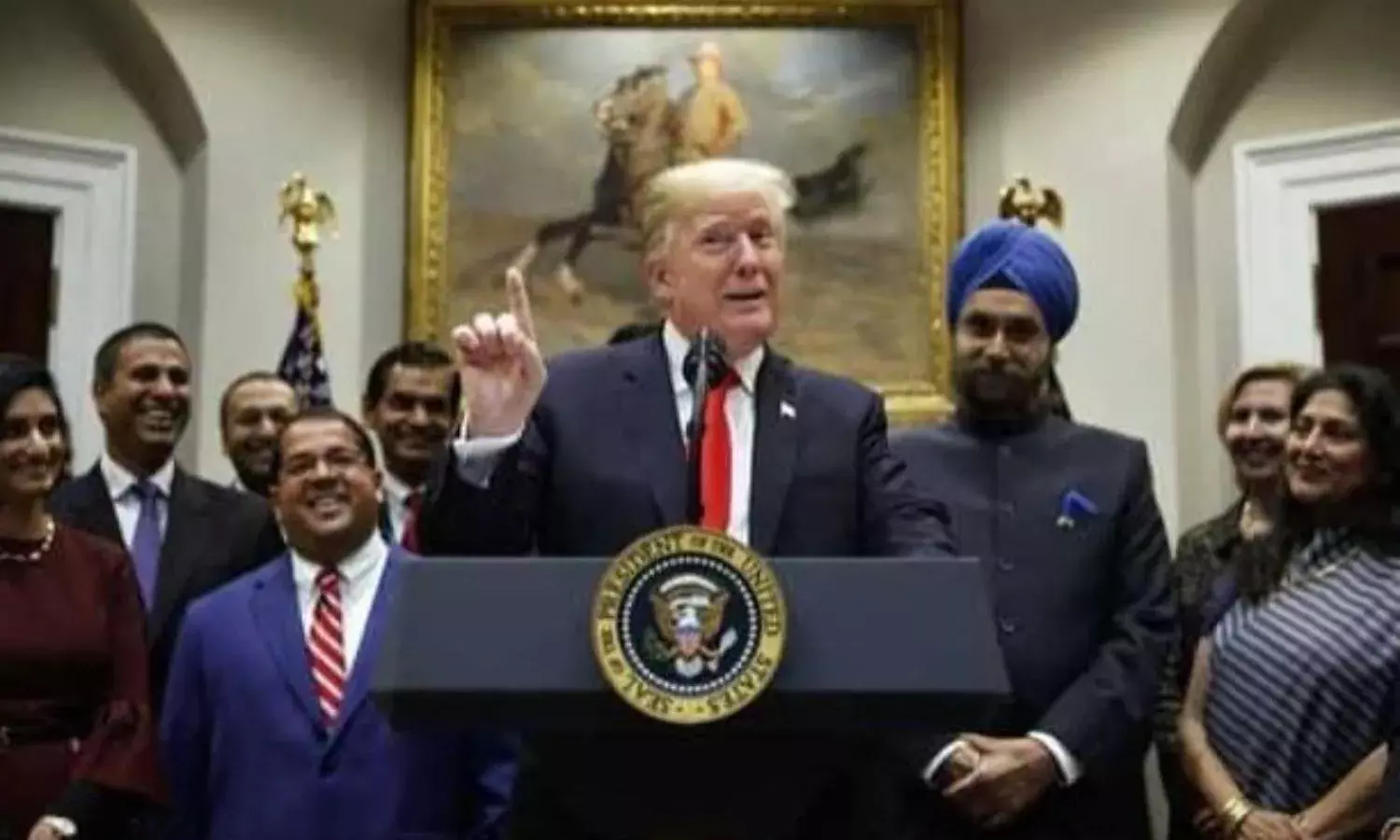Desi’s For Trump
28% behind Trump

A recent opinion poll in the USA suggests that some 28% of Indian origin voters are leaning towards Donald Trump and the rest are for Joe Biden. This is a major shift from 2016, when only 16% of Indian Americans preferred Trump over Hillary Clinton. Clearly the Trump bonding with Narendra Modi witnessed in the "Howdy Modi" rally in Houston where the Indian Prime Minister led the cheering with "ab ke baar Trump sarkar!" That and the Trump bashing of African Americans and Hispanics has clearly made an additional impression on the Indian Americans.
Some years ago Joel Stein wrote a witty and perfectly appropriate column in TIME Magazine “My Own Private India” about a town called Edison in New Jersey. Stein was thoroughly excoriated as racist and anti-Indian by people purporting to represent the Indian community in the USA.
TIME chipped in with an apology of its own but apparently not convinced about the extent of anger said: “we sincerely regret that any of our readers were upset by this humor column of Joel Stein’s” Very clever indeed, which is why TIME is what it is.
Edison has another reason to be deemed notorious. It is home to the only ethnic group that played host to Donald Trump in 2016. Over 5,000 people, including the elderly and children, attended the nearly 5-hour event organized by the Republican Hindu Coalition, founded and chaired by Indian-American industrialist Shalabh Kumar, Chairman and CEO of the AVG Group of Companies.
Indians and Indian-Americans turned out in numbers to show their support for Trump, carrying placards that read 'Trump Make America Great Again', 'Trump for Hindu Americans', 'Trump Great For India' and 'Trump for Faster Green Cards'. Dressed in traditional Indian finery, the audience broke into a loud applause and cheer as Trump came on stage against the backdrop of the American flag. Clearly the only thing that endears Trump to this lot is that he has come out vocally against all Muslims, followed up by his oft expressed prejudice against Blacks and Hispanics.
Edison is next door to Newark’s international airport and hence is the first destination for the just off the wide-bodied jet Indian would be immigrant. Thus, for many decades Edison has been a magnet for Indian immigrants, particularly those from the Indian state of Gujarat. Today about 20% of its estimated population of about 99,000 is identified as Indian American, most of them Gujarati.
I have driven through Edison NJ on a few occasions and it is not the kind of town I would want to live in. Its at once grungy and noisy, seems to teem with Indians noisily looking for bargains or cheap desi food. My friend with whom I used to drive through Edison used to describe it as the second armpit of America. The first one being Hoboken, also in New Jersey.
Desi means homegrown and is used in a self-pejorative manner by almost all NRI’s when referring to a fellow Indian. At last count there were over 2.8 million desi’s in the US. The US Census2000 map shows that Indian Americans (officially called Asian Indians) tend to concentrate themselves in certain areas. Whenever I visit the USA it never ceases to amaze me that my Indian American family and friends seem to only socialize with other desi’s. They do tend to flock together. The USA has a fair number of Indian American clusters.
But it is Edison that has the highest concentration. Indian Americans have the highest median incomes in the USA and are generally white-collar professionals in most parts of the USA. Edison’s Indian American community however has a fair sprinkling of less well-off people doing jobs which probably fetch them much less than the median Indian American income. It shows easily.
One out of five desi’s is of Gujarati origin, and like Indian’s from other regions tend to live and socialize within themselves. Gujarati’s, referred to within the desi community as gujju’s, are more entrepreneurial by nature and tend to be in business. The 600,000 strong Gujarati diaspora in the USA consequently has a smaller proportion of professionals. They now own more than half the economy lodging properties in the USA. Since a large proportion of the Gujarati’s in the USA have the Patel surname, these hotels are popularly referred to among the Indian American community as “potels” and quite often are places that rent out rooms by the hour. This is Modi country.
Indians, in general, are very racist, sectarian and colour conscious, and our standards of political correctness are not very high. Our everyday discourse is laced with racist and derogatory references to others. The desi community in the USA is not very different.
Mira Nair’s 1991 movie “Mississippi Masala” set among the Indian American community living in steaming Biloxi, Miss., captures in full all the prejudices and inward looking mores prevalent in Hindu society back home carrying on as before among an expatriate Indian American community. The story is about the romance a girl of Ugandan Indian Gujarati origin and a handsome African American, played by Denzel Washington. But expectedly the family and friends, mostly in the potel business, vigorously oppose the romance with a “kalu”, as persons of African origin are derogatively referred to by desi’s.
As America’s wealthiest median income community desis are now bigger players in US politics with PAC’s active in serving the many Indian causes, be it the Civil Nuclear deal with the USA or increase in the number of work visas. The economic clout of the Indian American is also felt in many ways. Its good that they have begun to flex their muscles a bit. But it is not good that some are showing themselves to be numbskulls.



